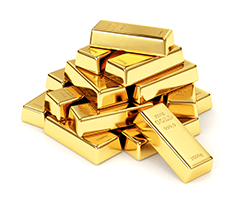"You can't eat gold." It's a saying that gets tossed around quite a bit in preparedness circles.

You Can't Eat Gold
It's a controversial statement because gold can be a big part of a lot of folks' emergency planning, especially in the case of economic collapse.
Yet, there is a point, and understanding that point has a lot of merit as each of us moves forward in our preparedness journey.
BASIC NECESSITIES: THE GOLD STANDARD OF PREPAREDNESS
First, before we go any further, I want you to know that I'm not disparaging investing in gold in any way. My intention today is to provide some perspective on why we prepare and how to best go about it. If our fiat-based currency fails and the economy built around it collapses, gold may become a powerful thing to have.
However, in the days, weeks and months following an economic collapse, the value of nearly everything will be uncertain. We won't instantly switch to a gold-backed economy.
An Example from History
Let's take a look at the Great Depression. Particularly the Weimar Republic in Germany in 1922-23. This was years before the Great Depression reached American shores, a nation still enjoying the "Roaring Twenties."
But in Germany, times were tough. Worker strikes across the Republic led to hyperinflation. The cost of a loaf of bread increased from 163 marks to 2 billion marks!
Did the Weimar Republic return to a system of gold exchange?
Absolutely not. They did, however, return to an economy we talk a lot about in these Survival Scouts - bartering (read our bartering tips here). People traded labor for goods, services for services and more.
Obviously, we know that the rise of the Nazis would transform the German economy again and lead us all into World War II.

The government took the gold
Some critics might like to point out here that had Germany returned to a gold standard before things got too bad, the whole situation could've been avoided. But I think it's a little difficult for anyone to make a wild speculation like that.
Barter was also big in America during the Great Depression. In fact, gold was never really an option for exchange, because, at the height of the Depression, the government confiscated all the gold they could get their hands on.
BASICS NEEDS - MUCH MORE PRECIOUS
The truth is, in any crisis, whether an economic crash or a natural disaster, basic human needs come first. The health, safety, and well-being of you and your family is the only way to get through the acute fallout of a crisis.

What is truly valuable for barter
And, as I've already mentioned, the goods and services that provide those needs are infinitely more valuable for barter in an immediate emergency situation.
Food. Water. Medicine. Repair skills. Hunting. Fishing. Foraging. These are the kinds of things that are much more precious to everyone when basic necessities are in short supply. And in any economic crisis, you can be sure that those items will be the first to fly off retail shelves - often in a mob of violence, rioting, and panic.
INVEST IN BALANCED PREPAREDNESS
Again, I'd like to reiterate that gold might not be a bad investment to hedge against economic collapse. However, it may take quite some time for us to pull out of the collapse and for gold to pay off, so to speak.

Learn gardening wherever you live
That's why we recommend a balanced approach to preparedness. Securing a rock-solid food storage plan now costs much less than an ounce of gold. Same with giving yourself the ability to ensure potable water. You can calculate how much food and water you'll need to survive, but it's almost impossible to predict how much gold you'll need to get through a crash - and purchase that same food and water in the future.
Finally, I want to leave you with a powerful thought. It is my belief that in a crisis, the most valuable commodity is not gold, silver, coffee. It's not even food or potable water.
The most valuable commodity in a crisis is The Survivor.
That's why, in addition to food storage and water filtration, the best and most valuable investment you can make is in yourself. Learning new skills along your preparedness journey costs very little money, and the time spent is well worth it. Becoming more self-reliant - every day and in a crisis - is virtually priceless.
I hope you've found this food for thought valuable. Have a great weekend and stay alert out there, friends!
In Liberty,
Grant Miller, Preparedness Advisor
My Patriot Supply


